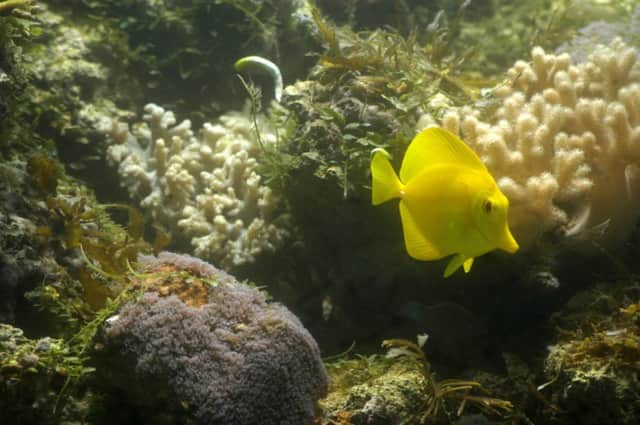Global warming ‘will drive fish towards poles’


They say global warming will also spark an invasion of alien species into polar waters.
Research by scientists at Canada’s University of British Columbia (UBC) shows rising ocean temperatures will cause large numbers of fish and other species to disappear from seas around the equator and rapidly be driven towards the poles.
Advertisement
Hide AdAdvertisement
Hide AdIn the worst-case scenario, where the Earth’s oceans heat up by 3C by 2100, fish could move away from their current habitats at a rate of 16 miles every ten years.
Under the least severe warming, with just a 1C rise, they say populations would move just over nine miles every decade. This is consistent with changes that have been observed in the past few decades, researchers said.
The UBC study identified zones in the tropics – between the Tropic of Cancer and the Tropic of Capricorn – as being at high risk of local fish extinctions.
This is believed to be partly due to marine species living in tropical environments being more sensitive to temperature change, combined with more dramatic rises occurring in warmer seas.
The worst effects are predicted to hit tropical regions of the Pacific, with the shallow waters around Indonesia being singled out as being at particular risk.
Warm waters play a critical role in regulating climate and large-scale weather patterns, while also supporting a large percentage of the planet’s marine species.
The water temperature in tropical oceans typically exceeds 20C and stays relatively constant throughout the year.
Using the same climate change scenarios as the Intergovernmental Panel On Climate Change (IPCC), the researchers projected a large-scale shift of marine invertebrates and fish towards the poles.
Advertisement
Hide AdAdvertisement
Hide AdScientists used modelling to predict how 802 commercially important species of fish and sea creatures react to warming water temperatures and other changing ocean properties such as acidification and new habitats opening up in polar regions.
They predict the biggest influxes of species to occur in Arctic regions such as the Barents, East Siberian and Greenland seas.
William Cheung, associate professor at the UBC Fisheries Centre and co-author of the study, said: “The tropics will be the overall losers. This area has a high dependence on fish for food, diet and nutrition. We’ll see a loss of fish populations that are important to fisheries and communities in these regions.”
Richard Harrington, from the environmental charity Marine Conservation Society, said the findings backed up earlier research presented by the IPCC and had implications for global food security.
He added: “Recently, models have predicted sea temperature change around the globe to be more marked than had been realised, with temperature rise at polar regions likely to be greater than at mid and low latitudes.”
UBC’s Miranda Jones, lead author of the study, said it was possible the movement of marine life could generate new opportunities for fisheries in the Arctic.